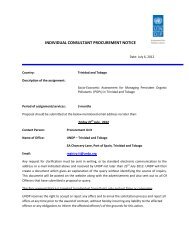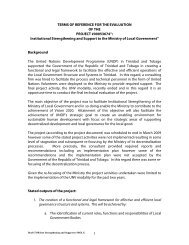The View from the Boardroom - UNDP Trinidad and Tobago
The View from the Boardroom - UNDP Trinidad and Tobago
The View from the Boardroom - UNDP Trinidad and Tobago
Create successful ePaper yourself
Turn your PDF publications into a flip-book with our unique Google optimized e-Paper software.
<strong>The</strong> <strong>View</strong> <strong>from</strong> <strong>the</strong> <strong>Boardroom</strong> - CEO Study on Corporate Social Responsibility in <strong>Trinidad</strong> <strong>and</strong> <strong>Tobago</strong>Drivers• <strong>The</strong>re is broad acceptance by CEOs of governmentinvolvement in CSR: Two-thirds of all CEOs (75.8%)embrace <strong>the</strong> idea of government intervention drivingCSR. This suggests a certain change in <strong>the</strong> traditionallydominant view of <strong>the</strong> business community that CSRshould be based on <strong>the</strong> voluntary commitment ofcompanies given that government intervention canlead to both incentivisation <strong>and</strong> <strong>the</strong> imposition oflegally binding regulatory frameworks. Acceptance ofgovernment involvement includes <strong>the</strong> developmentof a national CSR policy, something that 88.6% ofrespondents would welcome.• CEOs are keenly aware that often <strong>the</strong>ir CSRcommitments <strong>and</strong> <strong>the</strong>ir societal outreach makes<strong>the</strong>m corporate actors that effectively deliversocial services previously provided by government:Business leaders are mindful of <strong>the</strong>ir role as privatesector entities involved in social development whenassisting <strong>the</strong> government with <strong>the</strong> delivery of basicservices to vulnerable groups in society. 68.6% of CEOsthink it to be a correct assertion that <strong>the</strong>y are ‘doing <strong>the</strong>government’s job’ by getting engaged in CSR.• In <strong>the</strong> eyes of CEOs, consumer attitudes in <strong>Trinidad</strong><strong>and</strong> <strong>Tobago</strong> are, compared to o<strong>the</strong>r countries, lesseffective in bringing about a stronger complianceof businesses with ethical principles: Only 48.6%of CEOs think that a company’s social reputation is anincreasingly important factor in influencing consumers’purchasing decisions. Such cautious attitude towards<strong>the</strong> potential pressure generated by consumers is alsoreflected in <strong>the</strong> 85.3% of all CEOs who believe that social<strong>and</strong> environmental concerns would influence consumerbehaviour to a lesser extent than in o<strong>the</strong>r markets. Andonly 11.4% of respondents named consumers to beamong <strong>the</strong> main drivers for CSR.• CEOs believe that <strong>the</strong> workforce is an essentialdriver for CSR that would prompt <strong>the</strong>m as seniorcorporate decision-makers to become active in<strong>the</strong> field of sustainability: <strong>The</strong> focus of CEOs <strong>and</strong>company owners is firmly on <strong>the</strong>ir employees whenbeing asked to identify <strong>the</strong> most important factorsunderlying <strong>the</strong>ir ‘boardroom’ decision-making onCSR. 71.4% of all interviewees mentioned <strong>the</strong> area ofemployee engagement – comprising internal CSR <strong>and</strong>corporate volunteering – as a top consideration in <strong>the</strong>way <strong>the</strong>ir decisions on CSR activities are being made.Civil Society• <strong>The</strong> voluntary <strong>and</strong> non-governmental sector remainsrelatively weak in its attractiveness as a partnerfor private companies in <strong>the</strong> implementation ofCSR programmes: Only 37.1% of all respondentsmentioned Civil Society as a key driver for CSR in<strong>Trinidad</strong> <strong>and</strong> <strong>Tobago</strong>. Interviews with CEOs haveshown that corporate support for NGOs exists but thatlimitations in <strong>the</strong> organizational capacity of nonprofitorganizations <strong>and</strong> <strong>the</strong>ir often significant overhead costshas led to a situation in which only a few NGOs havebecome regular partners for private businesses.Corporate Volunteering• <strong>The</strong> personal commitment <strong>and</strong> previous involvementof CEOs in activities of corporate volunteerismdoes not necessarily translate into a greater degreeof ‘professionalization’ of volunteer management:<strong>The</strong> majority of CEOs have previously volunteeredas private individuals (85.7%) as well as in <strong>the</strong>ir roleas employees before joining <strong>the</strong> ‘boardroom’ (91.2%).This level of personal involvement would suggest that<strong>the</strong> majority of companies in <strong>Trinidad</strong> <strong>and</strong> <strong>Tobago</strong> hadestablished a formal corporate volunteer programme asa consequence. However, only 37.1% of all CEOs saidthat <strong>the</strong>ir companies operated an official employeevolunteer scheme.11
















